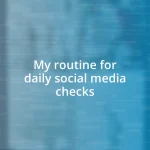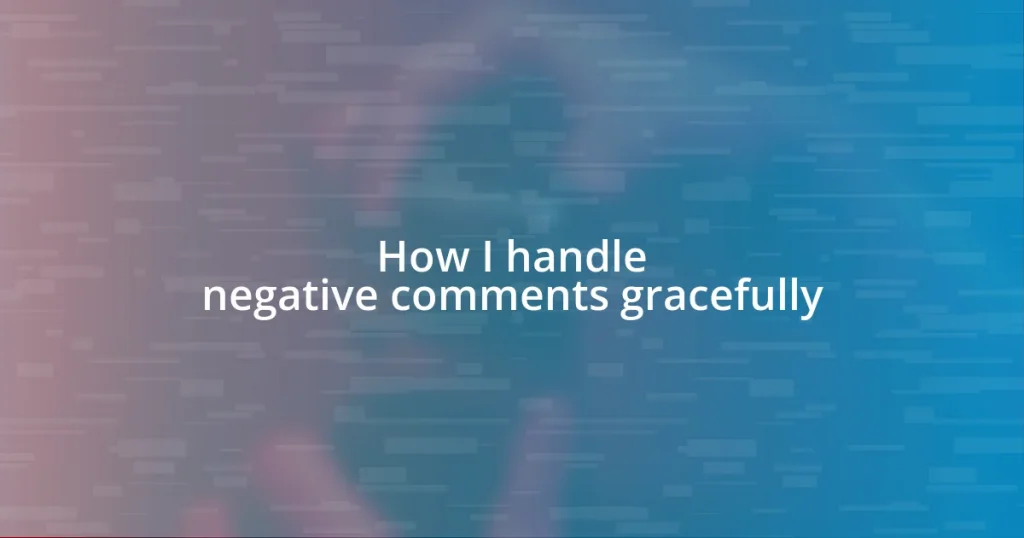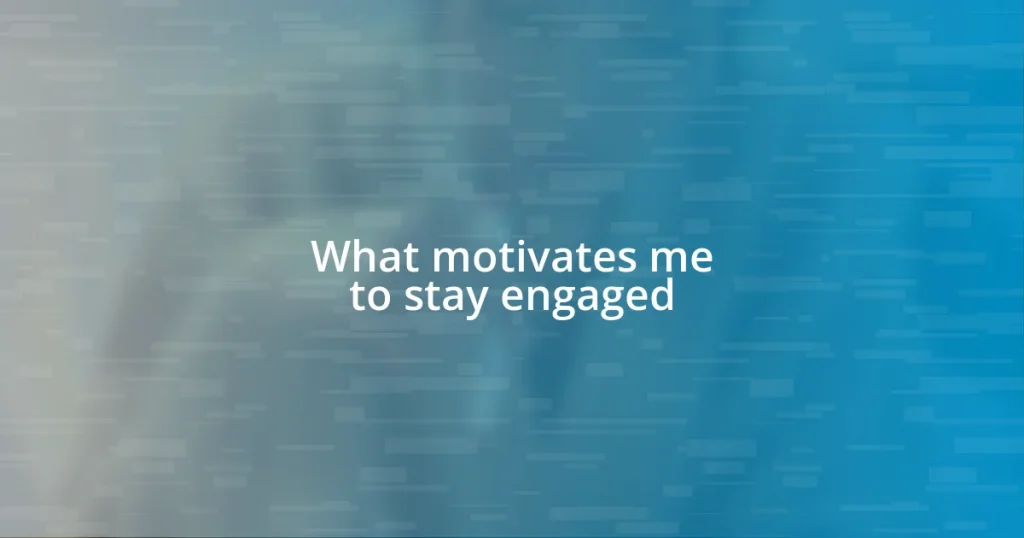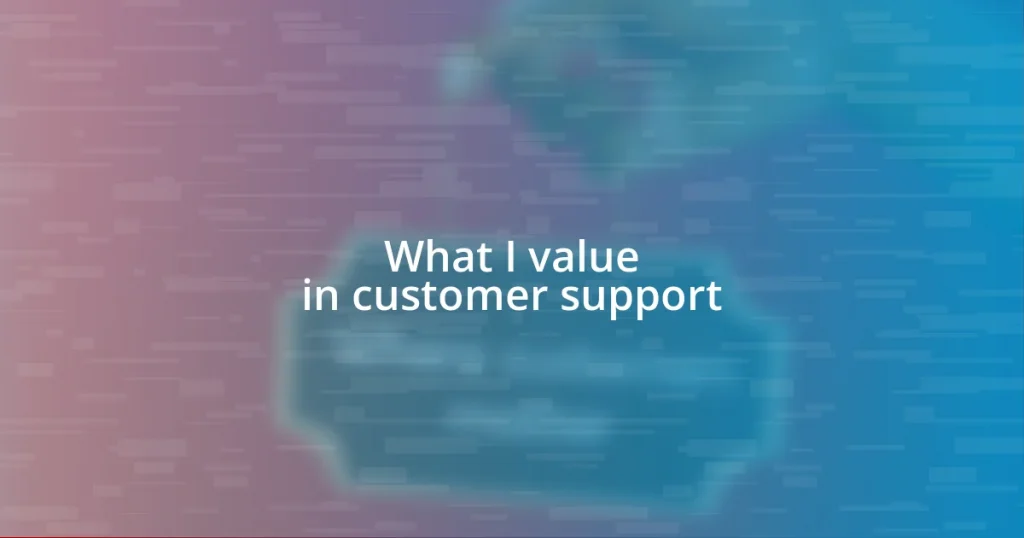Key takeaways:
- Embrace negative comments as opportunities for self-reflection and growth, rather than personal attacks.
- Respond thoughtfully to criticism by pausing to breathe and considering the intention behind the feedback.
- Build resilience over time by reframing negative experiences as stepping stones to development and inviting more critiques.
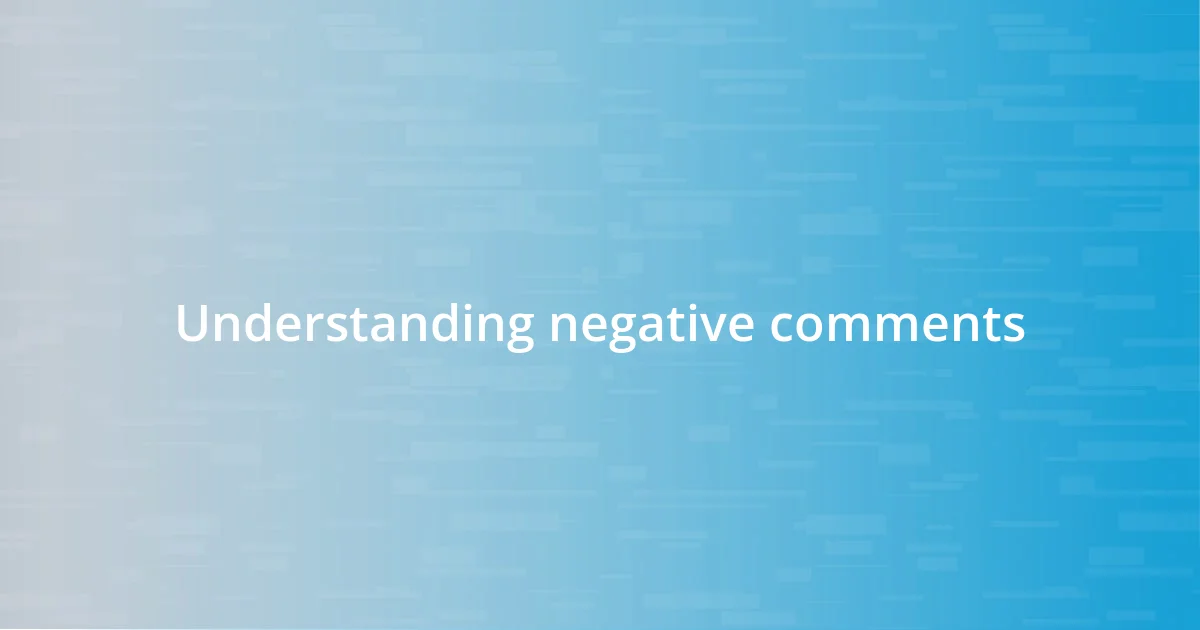
Understanding negative comments
Negative comments can feel like sudden jolts to the system, right? I vividly remember receiving a harsh critique on a project I poured my heart into. At that moment, it felt demoralizing, but I soon realized that such feedback reveals more about the commentator’s perspective than my abilities.
Understanding the nature of these comments is crucial. Often, they stem from the critic’s own experiences or frustrations. Have you ever found yourself projecting your mood onto someone else’s work? I certainly have, and recognizing this helps humanize the feedback, making it less about me and more about their viewpoint.
It’s interesting to note that negative comments often serve as a lens for self-reflection. I’ve learned to ask myself, “What can I learn from this?” There was a time when I filed away criticism as simply negativity, but now, it’s less about the sting and more about the opportunity. How do you choose to grow from criticism? Embracing this mindset has been enlightening, turning potential hurt into priceless insights.
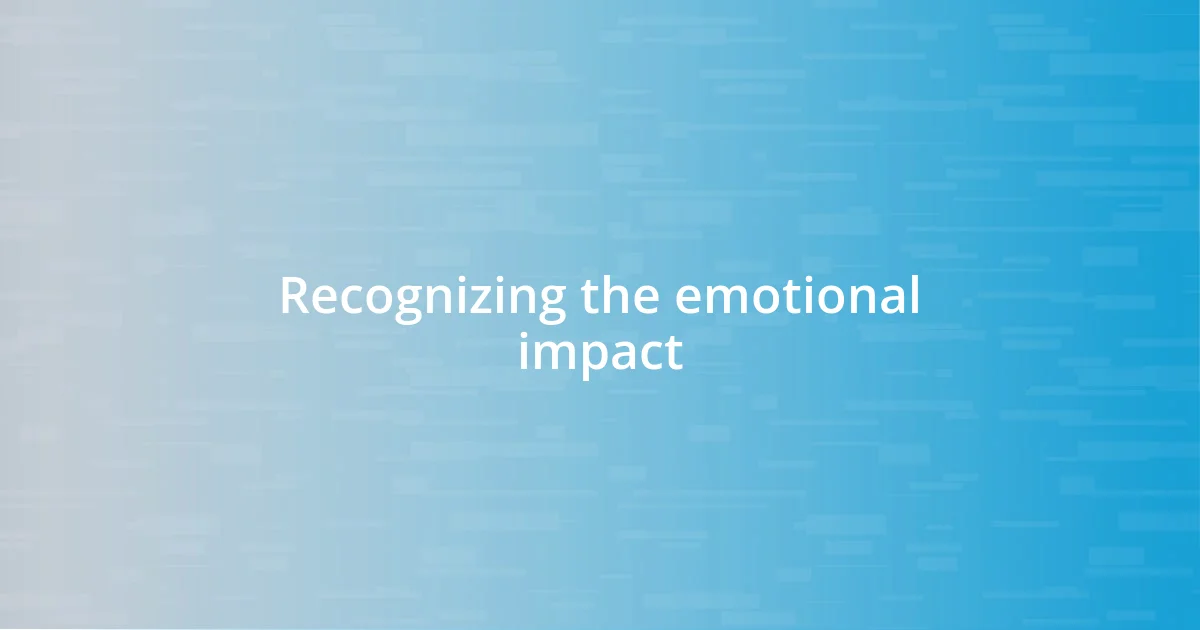
Recognizing the emotional impact
Recognizing the emotional impact of negative comments can be challenging. The first wave of hurt often morphs into a reflection of our self-worth. I recall reading an unkind review of my writing, and my immediate reaction was one of self-doubt. It’s vital to acknowledge these feelings instead of brushing them aside. Experiencing these emotions doesn’t make us weak; it shows we care deeply about our work.
As I navigated these murky waters, I learned that the intensity of my response often correlated with my level of investment in the task. For instance, after working tirelessly on a design project, receiving a dismissive comment felt like a personal attack. I realized that the emotional impact of negative feedback could serve as a measure of my passion. In recognizing this, I gradually started to separate my emotional state from the critique itself, understanding that it often doesn’t reflect the complete picture.
It’s compelling to consider that we all process these comments differently. While one comment might feel like a door closing, another might inspire someone to push back harder. For example, in group discussions, I have witnessed varying reactions—some people seem unfazed, while others visibly shrank. This insight taught me that emotional resilience varies, and recognizing this diversity can foster a more compassionate response to both ourselves and those sharing their opinions.
| Emotional Reaction | Description |
|---|---|
| Initial Hurt | A rush of self-doubt and vulnerability |
| Reflective Growth | Shifting focus to learning from the feedback, lessening personal sting |
| Diverse Responses | Recognition that others may react differently, fostering empathy |
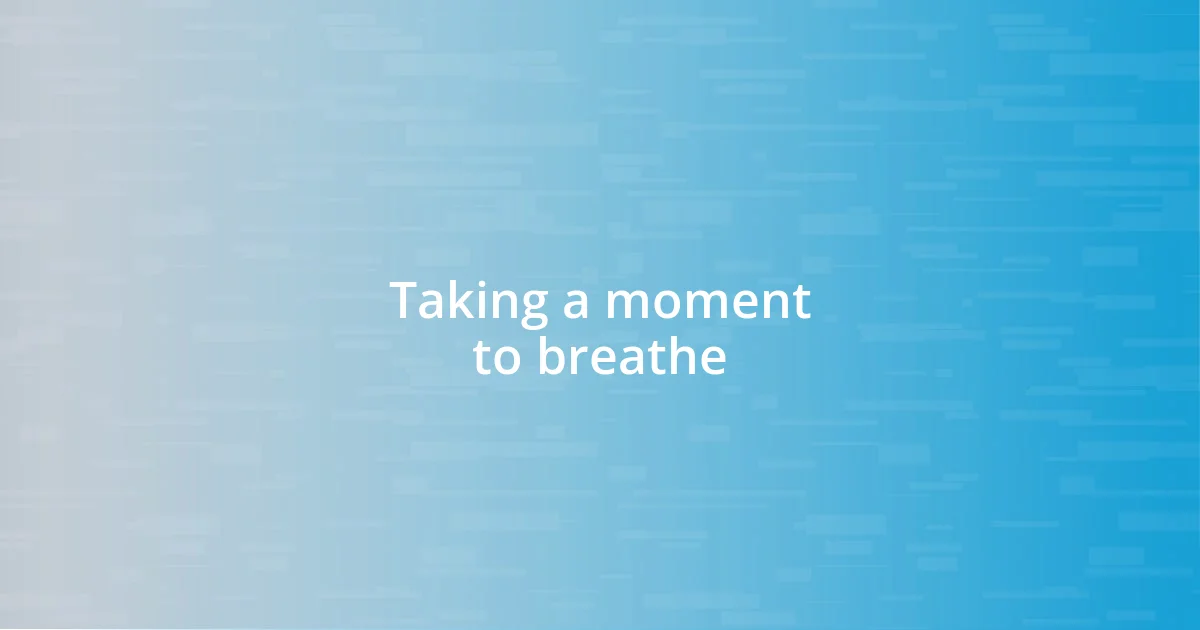
Taking a moment to breathe
Taking a moment to breathe is a vital first step in responding to negative comments. When I face criticism, I’ve found that pausing and inhaling deeply can ground me. This simple act creates a buffer, allowing me to step back and assess the feedback more rationally. I remember a time during a team meeting when I overheard negative remarks about my presentation. Instead of reacting impulsively, I took a few seconds to breathe. Doing so helped me regain composure and approach the comments more thoughtfully.
- Breathing allows for clarity: It gives my mind a chance to process before I react.
- It reduces the emotional charge: Taking a moment can help lower anxiety and stress associated with criticism.
- Reflective space: This pause helps create room for reflection rather than defensiveness.
Stopping to breathe doesn’t just calm my nerves; it reorients my perspective. I often visualize this moment as a tree swaying gently in the wind. It reminds me that, like that tree, I can bend but not break under the weight of negative feedback. In those quiet moments, I allow myself to think about the intentions behind the comments. Often, this reflection reveals a pattern or offers insights I hadn’t considered before. By taking that breath, I openly invite growth into the conversation instead of allowing hurt feelings to dictate my reaction.
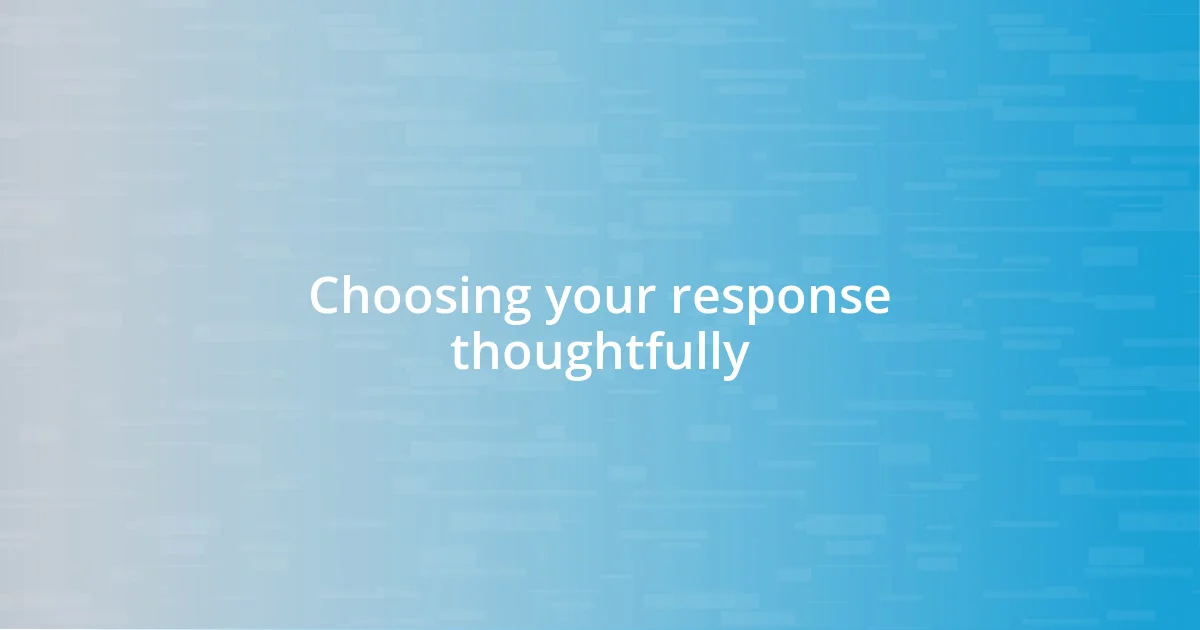
Choosing your response thoughtfully
Choosing your response thoughtfully is crucial when dealing with negative comments. I often remind myself that my initial reaction can set the tone for the entire conversation. I vividly recall a time when a colleague dismissed my idea during a brainstorming session. Instead of immediately defending myself, I paused to consider why they felt that way. Was it the delivery of my idea, or perhaps something else entirely? This reflection allowed me to respond with curiosity rather than defensiveness, and the dynamic shifted from confrontation to collaboration.
In moments like these, assessing the feedback is key. I’ve experienced different degrees of critique, from vague comments to harsh criticisms. When a sharp critique arrives, I try to dissect it. Is there a kernel of truth I can learn from? Recently, a reader called my work “unoriginal,” which stung initially. Yet, rather than retaliating, I took a step back. I asked myself, “What can I do to diversify my approach?” This introspection shifted my energy from feeling attacked to seeking growth, reminding me that every comment can feed into my personal development.
Moreover, I think about the intention behind the comment. Often, negativity stems from a personal place for the commenter. I’ve found it helpful to question: “What might they be feeling?” For instance, when a friend critiqued my latest piece, I sensed their frustration came not from my work, but from their own struggles. Understanding this not only softened my response, but it also deepened our connection. In my experience, these nuanced responses can transform an uncomfortable moment into an opportunity for dialogue.
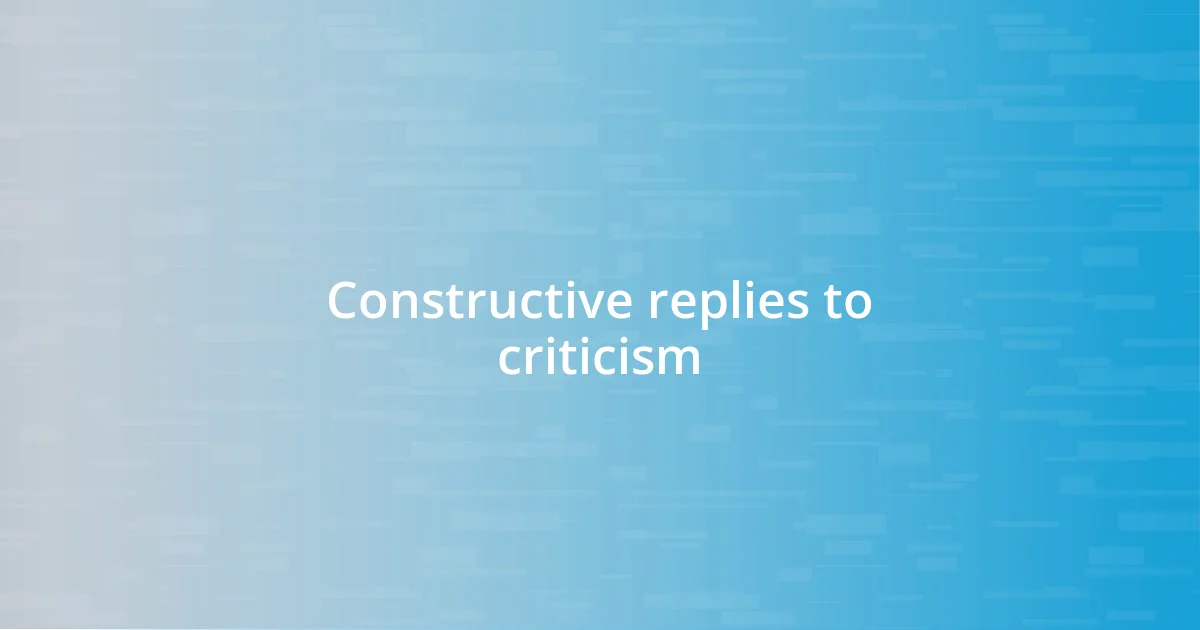
Constructive replies to criticism
Responding constructively to criticism can often feel daunting, but I’ve learned that it’s an opportunity for dialogue rather than conflict. One time, a mentor gave me feedback on a project that I thought was my best work. Instead of dismissing their comments as harsh, I paused, embraced my vulnerability, and asked, “What specific changes do you suggest?” Their insights not only enhanced my project but also deepened our professional relationship. This experience taught me that engaging actively with criticism fosters growth and connection.
When it comes to my responses, I like to embody a spirit of gratitude. A few months back, a peer pointed out flaws in a proposal I was excited about. At first, I felt defensive, but then I reminded myself that their perspective could help me improve. So, I thanked them for their honesty and asked clarifying questions about their concerns. This shift in approach transformed the feedback session into a constructive brainstorming conversation, illustrating how openness can lead to richer ideas and stronger collaborations.
I’ve also found value in sharing my feelings after a critique. Recently, I received a critical email about my writing style. Initially, it felt like a punch to the gut, but I took a moment to reflect and responded with, “I appreciate your honesty. While I was hurt, I want to improve. Could you highlight specific areas where I can make adjustments?” This kind of transparency not only disarmed the situation but also invited a more meaningful discussion, reinforcing that while criticism can sting, it can also pave the way for growth and understanding.
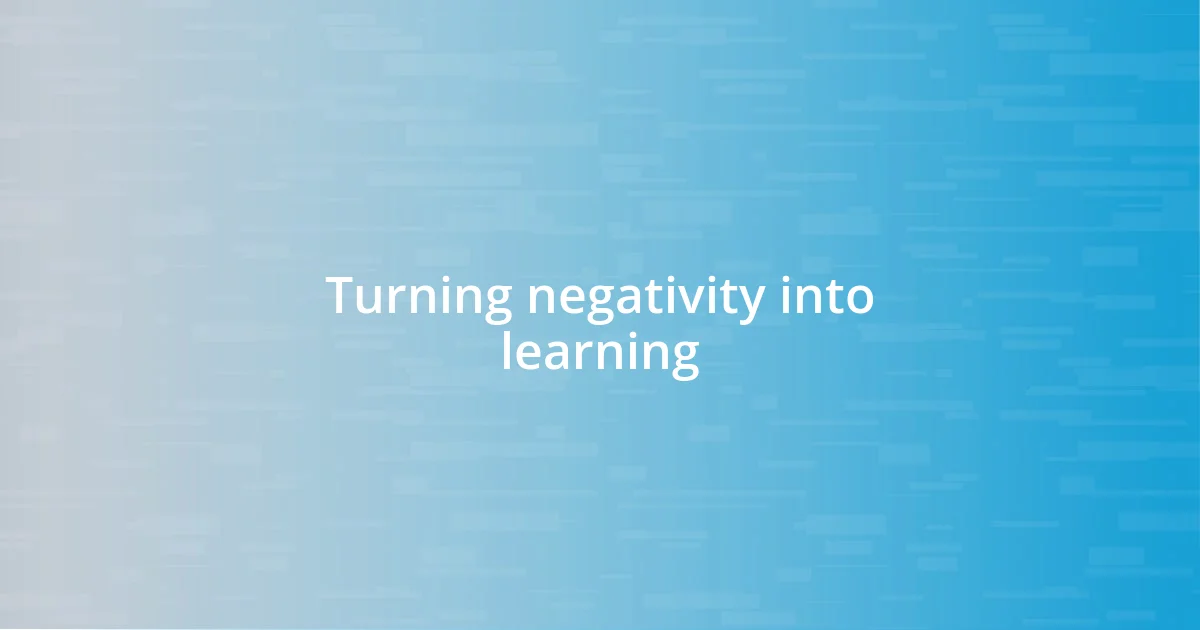
Turning negativity into learning
When faced with negative comments, I often find that a shift in perspective can be transformative. For instance, there was a time when a critical review of my presentation made me question my abilities. Instead of spiraling into self-doubt, I asked myself, “What can I learn from this?” This question turned my discomfort into a proactive approach, leading me to seek feedback from trusted colleagues. In that process, I uncovered valuable tips that not only improved my public speaking skills but also boosted my confidence.
Reflecting on negativity has become a powerful tool for me. I remember a time when someone pointed out inconsistencies in my work. I could have easily brushed off their comments as nitpicking, but I decided to take a closer look instead. “What if there’s something here that can help me?” I thought, and in doing so, I found patterns I hadn’t noticed before. This allowed my work to evolve, showcasing that unresolved feedback can lead to deeper understanding and improvement if I’m open to exploring it.
Another memorable instance was when a peer voiced concern over my leadership style. Instead of feeling hurt, I embraced the moment as an opportunity for personal growth. I asked myself, “What if their feedback reflects a valid concern I need to address?” This introspection led me to seek additional resources on effective leadership. I realized that while negative comments can sting, they also hold the potential for profound growth if approached with curiosity and an open heart.
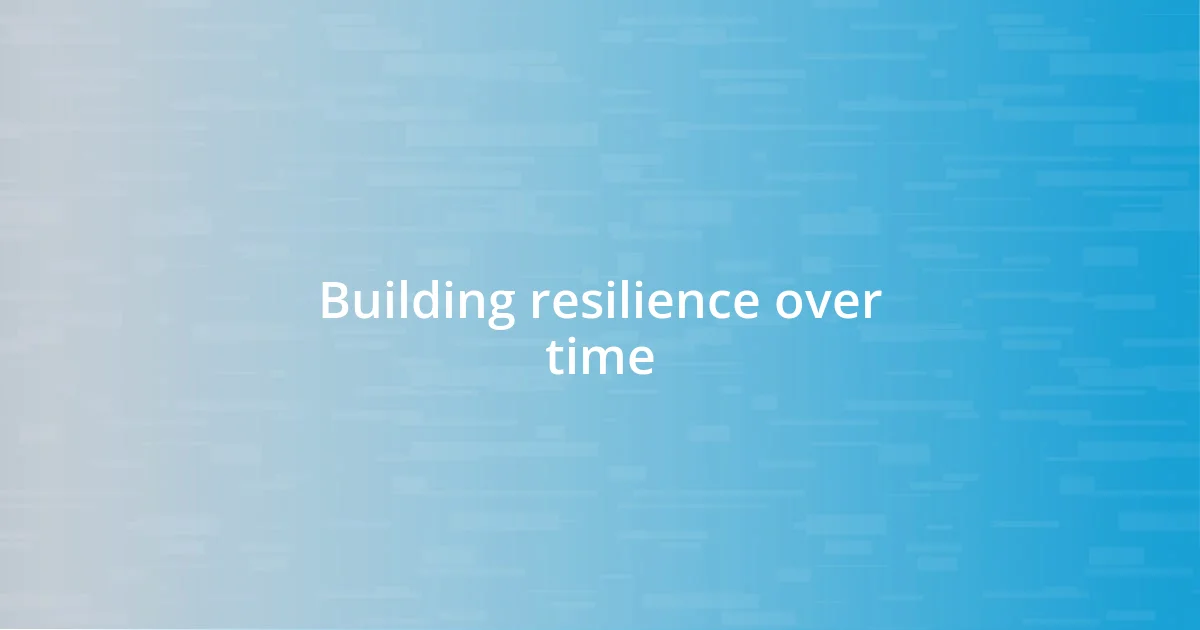
Building resilience over time
Building resilience is a gradual process influenced by the way we frame our experiences. I recall a time when a negative comment about my project left me feeling defeated. Instead of viewing it as a setback, I chose to see it as an opportunity for re-evaluation. Have you ever felt that initial sting, then realized it’s a chance to evolve? It’s in those moments of discomfort that I found the foundation of my resilience began to strengthen.
As I navigated through various critiques over the years, I realized each instance contributed to my overall growth. For instance, after receiving some tough feedback on my writing, I challenged myself to invite more critiques rather than shying away from them. Wouldn’t it be easier to stick with what feels comfortable? Yet, every uncomfortable conversation has become an opportunity for growth, helping me reinforce my ability to bounce back from negativity.
Engaging with these experiences has turned me into a more resilient person. I often reflect on whether my emotional reactions stem from the criticism itself or my perception of it. Once, a former colleague bluntly criticized my approach to a project. At first, I found myself spiraling into self-doubt, but then I realized—what if I reframed this moment as a stepping stone rather than a stumbling block? This shift in mindset allowed me to take ownership of the feedback and cultivate a tougher skin over time. Resilience doesn’t happen overnight; it’s about nurturing that shift every time life throws a challenge our way.








